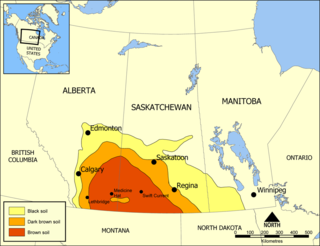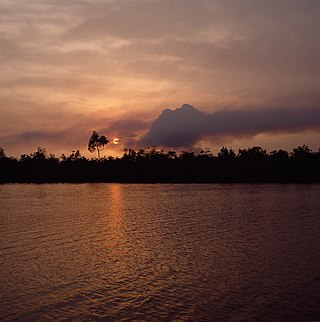
In the United States, national forest is a classification of protected and managed federal lands. National forests are largely forest and woodland areas owned collectively by the American people through the federal government, and managed by the United States Forest Service, a division of the United States Department of Agriculture. The U.S. Forest Service is also a forestry research organization who provides financial assistance to state and local forestry industry. As of 2020, there are 154 national forests in the United States.

The United States Department of Agriculture (USDA) is the federal executive department responsible for developing and executing federal laws related to farming, forestry, rural economic development, and food. It aims to meet the needs of commercial farming and livestock food production, promotes agricultural trade and production, works to assure food safety, protects natural resources, fosters rural communities and works to end hunger in the United States and internationally. It is headed by the Secretary of Agriculture, who reports directly to the President of the United States and is a member of the president's Cabinet. The current secretary is Tom Vilsack, who has served since February 24, 2021.

The Federal Deposit Insurance Corporation (FDIC) is one of two agencies that supply deposit insurance to depositors in American depository institutions, the other being the National Credit Union Administration, which regulates and insures credit unions. The FDIC is a United States government corporation supplying deposit insurance to depositors in American commercial banks and savings banks. The FDIC was created by the Banking Act of 1933, enacted during the Great Depression to restore trust in the American banking system. More than one-third of banks failed in the years before the FDIC's creation, and bank runs were common. The insurance limit was initially US$2,500 per ownership category, and this was increased several times over the years. Since the enactment of the Dodd–Frank Wall Street Reform and Consumer Protection Act in 2010, the FDIC insures deposits in member banks up to $250,000 per ownership category. FDIC insurance is backed by the full faith and credit of the government of the United States of America, and since its start in 1933 no depositor has ever lost a penny of FDIC-insured funds.

Agriculture is a major industry in the United States, which is a net exporter of food. As of the 2017 census of agriculture, there were 2.04 million farms, covering an area of 900 million acres (1,400,000 sq mi), an average of 441 acres per farm.

The Agricultural Research Service (ARS) is the principal in-house research agency of the United States Department of Agriculture (USDA). ARS is one of four agencies in USDA's Research, Education and Economics mission area. ARS is charged with extending the nation's scientific knowledge and solving agricultural problems through its four national program areas: nutrition, food safety and quality; animal production and protection; natural resources and sustainable agricultural systems; and crop production and protection. ARS research focuses on solving problems affecting Americans every day. The ARS Headquarters is located in the Jamie L. Whitten Building on Independence Avenue in Washington, D.C. and the headquarters staff is located at the George Washington Carver Center (GWCC) in Beltsville, Maryland. For 2018, its budget was $1.2 billion.

Tula Oblast is a federal subject of Russia. It is geographically in the European Russia region of the country and is part of the Central Federal District, covering an area of 25,700 square kilometers (9,900 sq mi) and a population of 1,553,925 (2010).
The Brazilian Institute of Geography and Statistics is the agency responsible for official collection of statistical, geographic, cartographic, geodetic and environmental information in Brazil. IBGE performs a decennial national census; questionnaires account for information such as age, household income, literacy, education, occupation and hygiene levels.

The Missouri Coteau, or Missouri Plateau, is a large plateau that stretches along the eastern side of the valley of the Missouri River in central North Dakota and north-central South Dakota in the United States. In the Canadian provinces of Saskatchewan and Alberta this physiographic region is classified as the Uplands Missouri Coteau, which is a part of the Great Plains Province or Alberta Plateau Region, which extends across the southwest corner of the province of Saskatchewan as well as the southeast corner of the province of Alberta. Historically, in Canada the area was known as the Palliser's Triangle and regarded as an extension of the Great American Desert and unsuitable for agriculture and thus designated by Canadian geographer and explorer John Palliser. The terrain of the Missouri Coteau features low hummocky, undulating, rolling hills, potholes, and grasslands. Apart from being a geographical area, the Missouri Coteau also has a cultural connection to the people of the area, the Métis people of South Dakota, along with other Indigenous groups. The history of this plateau is large, and the Missouri Coteau has a significance to these people.

Ondo State is a state in southwestern Nigeria. It was created on 3 February 1976 from the former Western State. It borders Ekiti State to the north, Kogi State to the northeast, Edo State to the east, Delta State to the southeast, Ogun State to the southwest, Osun State to the northwest, and the Atlantic Ocean to the south. The state's capital is Akure, the former capital of the ancient Akure Kingdom. The State includes mangrove-swamp forest near the Bights of Benin.
Natural Resources Conservation Service (NRCS), formerly known as the Soil Conservation Service (SCS), is an agency of the United States Department of Agriculture (USDA) that provides technical assistance to farmers and other private landowners and managers.
The United States National Agricultural Library (NAL) is one of the world's largest agricultural research libraries, and serves as a national library of the United States and as the library of the United States Department of Agriculture. Located in Beltsville, Maryland, it is one of five national libraries of the United States. It is also the coordinator for the Agriculture Network Information Center (AgNIC), a national network of state land-grant institutions and coordinator for the U.S. Department of Agriculture (USDA) field libraries.

Ebonyi State is a state in the South-East geopolitical zone of Nigeria, bordered to the north and northeast by Benue State, Enugu State to the west, Cross River State to the east and southeast, and Abia State to the southwest. Named for the Abonyi (Aboine) River—a large part of which is in the state's south—Ebonyi State was formed from parts of Abia and Enugu state in 1996 and has its capital as Abakaliki.

Bayelsa is one of the states in the South-South region of Nigeria, located in the core of the Niger Delta region. Bayelsa State was created in 1996 and was carved out from Rivers State, making it one of the newest states in the federation. Yenagoa is the capital city of Bayelsa State with most parts to have fallen within the high-risk of floods, suspects to occur annually. It shares a boundary with Rivers State to the East and Delta State to the west, with the waters of the Atlantic Ocean dominating its southern borders. It has a total area of 10, 773 km2. The state comprises eight Local Government Areas. they are Ekeremor, Kolokuma/Opokuma, Yenagoa, Nembe, Ogbia, Sagbama, Brass and Southern Ijaw. The state shares borders with Rivers State, of which it was formerly part, and Delta State.

Itapaci is a municipality in northern Goiás state, Brazil. The population was 18,458 in 2010 (IBGE). The total area of the municipality was 956.1 km² (10/10/2002).
The California Department of Conservation is a department within the government of California, belonging to the California Natural Resources Agency. With a team of scientists, engineers, environmental experts, and other specialists, the Department of Conservation administers a variety of programs vital to California's public safety, environment and economy. The department's mission is to manage California's working lands. It regulates oil, natural gas and geothermal wells; studies and maps earthquakes and other geologic phenomena; maps and classifies areas containing mineral deposits; ensures reclamation of land used for mining; and administers agricultural and open-space land conservation programs. A division within the department dedicated to encouraging beverage container recycling has been moved into the newly created Department of Resources Recovery and Recycling (CalRecycle). Despite the similar name, the Department of Conservation should not be confused with the California Conservation Corps, another department within the Natural Resources Agency, which provides work experience for young adults. The Department of Conservation often collaborates with its federal equivalents, such as the U.S. Geological Survey.

Theodore Ahamefule Orji CON is a Nigerian politician who was governor of Abia State in southeast Nigeria from 2007 to 2015. He was formerly a career civil servant, and served as the Chief of Staff to Abia Governor Orji Uzor Kalu.

An abandoned mine is a mine or quarry which is no longer producing or operational and, there is no responsible party to finance the cost to address the remediation and/or restoration of the mine feature/site. Terms and definitions vary though the common theme is that the cost to address the hazards is typically borne by the public/taxpayer/government.

Palotina is a Brazilian municipality in western Paraná state, located around 60 kilometers from the border with Paraguay.

The Federal Ministries of Nigeria are civil service departments that are responsible for delivering various types of government service. Each ministry is headed by a Permanent Secretary who reports to a Minister in the Federal Cabinet. Some government functions are provided by "commissions" or parastatals that may be independent or associated with a ministry.
Brex Inc is an American financial service and technology company based in San Francisco, California. Brex offers business credit cards and Cash Management Accounts to technology companies. Brex cards are business charge cards, which require at least $50,000 in a bank account if professionally invested, if not with $100,000 to open, and cardholders who default won't damage their personal credit or assets. Emigrant Bank issues the Brex cards.















